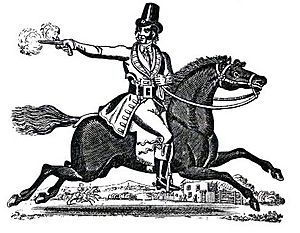Highwayman facts for kids
A highwayman was a type of robber who attacked people traveling on roads. They were common in the British Isles from the 1500s to the 1800s. Highwaymen rode horses, which made them seem more important than "footpads" who robbed on foot.
Some highwaymen worked alone, but others were part of gangs. They often targeted coaches because coaches did not have much protection. They stole money, jewelry, and other valuable items. The punishment for robbery with violence was execution by hanging.
One of the most famous highwaymen was Dick Turpin, who was hanged in 1739. The Australian bushranger Ben Hall was also sometimes called a highwayman. Some of the most dangerous places for highwaymen were Shooter’s Hill and Finchley Common. Not only men were highwaymen; women were too!
The word highwayman was first used around 1617. People sometimes called them "knights of the road" or "gentlemen of the road" to make them sound more exciting. In the 1800s in America, they were called road agents. In Australia, they were known as bushrangers.
Contents
How Highwaymen Robbed People
The busiest time for highwaymen was from the mid-1600s to the early 1700s. Some highwaymen were soldiers who had left the army after wars. What helped them most was that there were no strong police forces. Local police were not very good, and it was hard to catch and arrest robbers.
Most highwaymen stopped travelers and took their money. Some also stole valuable papers that could be turned into money. Others made deals with people who transported goods. These carriers would regularly pay the highwaymen to be left alone.
Highwaymen often attacked coaches because they were easy targets. This included public stagecoaches. Even the postboys who carried the mail were often robbed. A common demand was "Stand and deliver!" or "Your money or your life!"
Dangerous Places for Travelers
English highwaymen often waited on the main roads leading out of London. They usually chose lonely areas like heathland or woodland. Hounslow Heath was a favorite spot because roads to Bath and Exeter crossed it. Bagshot Heath in Surrey was another dangerous place on the road to Exeter. One of the most famous dangerous spots in England was Shooter's Hill on the Great Dover Road. Finchley Common, on the Great North Road, was almost as bad.
South of London, highwaymen tried to rob rich travelers on roads going to and from the Channel ports. They also targeted roads to fancy places like Epsom, which became a popular spa town in 1620. Banstead Downs, where horse races were popular, also attracted them. Later, in the 1700s, the road from London to Reigate and Brighton through Sutton became a highwayman hotspot. Other dangerous open areas included Blackheath, Putney Heath, Streatham Common, Mitcham Common, Thornton Heath, Sutton Common, Banstead Downs, and Reigate Heath.
In the late 1600s and early 1700s, highwaymen in Hyde Park were so common that King William III had the road between St James's Palace and Kensington Palace (Rotten Row) lit at night with oil lamps. This was done to protect against them. It became the first artificially lit highway in Britain.
Punishment for Highwaymen
The punishment for robbery with violence was hanging. Most famous English highwaymen ended up on the gallows. The main place for executions in London was Tyburn Tree. Highwaymen like Claude Du Vall, James MacLaine, and Sixteen-string Jack were hanged there. People who came to watch often admired highwaymen who went to the gallows laughing or showing no fear.
Why Highwaymen Disappeared
After about 1815, highwaymen on horseback were rarely seen. The last recorded robbery by a mounted highwayman happened in 1831. Their decline also happened as new guns, like the pepper-box and percussion revolver, became easier and cheaper for regular people to buy.
The growth of railways is sometimes mentioned as a reason, but highwaymen were already disappearing before the railway network was fully built. The expansion of turnpikes, which were roads with gates and guards where you paid a fee, made it harder for highwaymen to escape. However, they could just use other roads that were not turnpikes.
Cities like London also started to have much better police. In 1805, a group of mounted police began to patrol the areas around London at night. London was growing fast, and some of the dangerous open spaces near the city, like Finchley Common, were being covered with buildings. This just pushed the robbers further out, but it didn't fully explain their decline.
Using more banknotes instead of gold coins also made life harder for robbers, as banknotes were easier to trace. After the Inclosure Act of 1773, which put stone walls around open lands, highway robberies sharply decreased. These walls trapped escaping highwaymen on the roads, which now had walls on both sides and were better patrolled.
Finally, the huge increase in population during the Industrial Revolution meant there were simply more people around. This made the idea of a truly remote place in England a thing of the past.
Images for kids
-
Asalto al coche (Robbery of the coach), by Francisco de Goya.
-
English highwayman James Hind depicted in an engraving now in the National Portrait Gallery.
See also
 In Spanish: Salteador de caminos para niños
In Spanish: Salteador de caminos para niños
- List of highwaymen
- Brigandage
- Bushranger
- Dacoity
- Hajduk
- Mail robbery
- Marauder (disambiguation)
- Piracy
- Renegade Nell
- Road agent (disambiguation)
- Social bandits
- Thuggees




